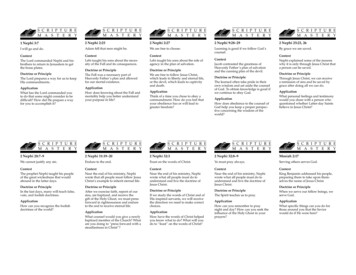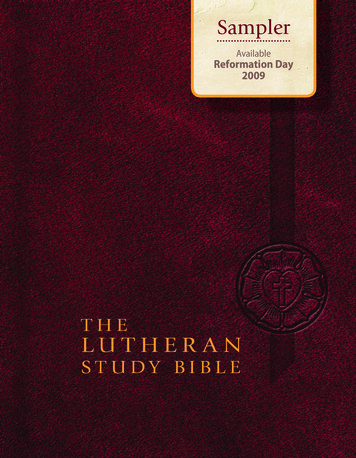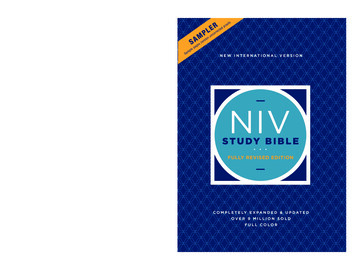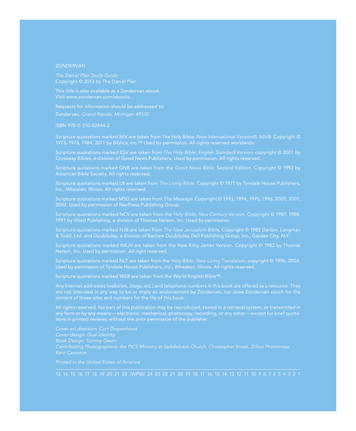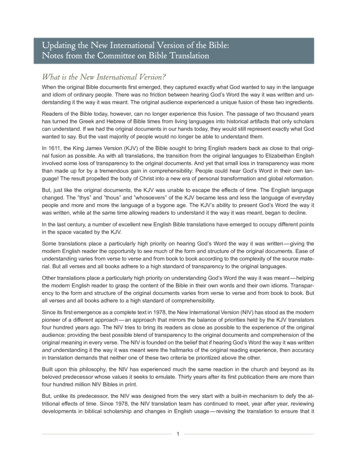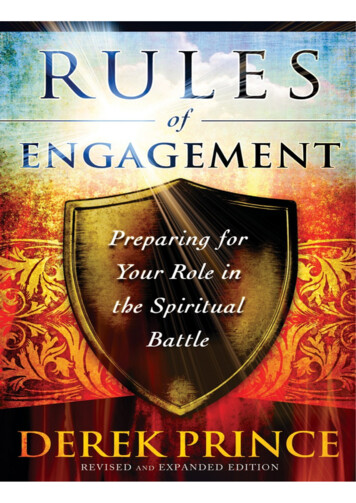
Transcription
2006, 2012 by Derek Prince Ministries–InternationalThis book was compiled from the extensive archives of Derek Prince’s unpublished materials and edited by the Derek PrinceMinistries editorial team.Published by Chosen Books11400 Hampshire Avenue SouthBloomington, Minnesota 55438www.chosenbooks.comChosen Books is a division ofBaker Publishing Group, Grand Rapids, Michiganwww.bakerpublishinggroup.comEbook edition created 2012All rights reserved. No part of this publication may be reproduced, stored in a retrieval system or transmitted in any form or byany means—for example, electronic, photocopy, recording—without the prior written permission of the publisher. The onlyexception is brief quotations in printed reviews.ISBN 978-1-4412-5998-1Library of Congress Cataloging-in-Publication Data is on file at the Library of Congress, Washington, DC.Unless otherwise identified, Scripture quotations are from the New King James Version. Copyright 1982 by Thomas Nelson,Inc. Used by permission. All rights reserved.Scripture quotations identified NASB are from the New American Standard Bible , copyright 1960, 1962, 1963, 1968, 1971,1972, 1973, 1975, 1977, 1995 by The Lockman Foundation. Used by permission.Scripture quotations identified NIV are taken from the HOLY BIBLE, NEW INTERNATIONAL VERSION . Copyright 1973,1978, 1984 Biblica. Used by permission of Zondervan. All rights reserved.Scripture quotations identified NLT are from the Holy Bible, New Living Translation, copyright 1996, 2004, 2007 by TyndaleHouse Foundation. Used by permission of Tyndale House Publishers, Inc., Carol Stream, Illinois 60188. All rights reserved.Scripture quotations identified RSV are from the Revised Standard Version of the Bible, copyright 1952 [2nd edition, 1971] bythe Division of Christian Education of the National Council of the Churches of Christ in the United States of America. Used bypermission. All rights reserved.Scripture quotations identified TLB are from The Living Bible, copyright 1971. Used by permission of Tyndale HousePublishers, Inc., Wheaton, Illinois 60189. All rights reserved.Scripture quotations identified KJV are from the King James Version of the Bible.The internet addresses, email addresses, and phone numbers in this book are accurate at the time of publication. They areprovided as a resource. Baker Publishing Group does not endorse them or vouch for their content or permanence.Cover design by Kirk DouPonce, DogEared Design
CONTENTSCoverTitle PageCopyright PageIntroduction 7Part 1 Building a Soldier’s Character1. Our Struggle with Obedience 112. Who Will Qualify? 213. Requirements for God’s Army 274. Finding Inner Harmony 355. Testing vs. Chastening 436. The Hardest Test of All 577. Denying the “Old Man” 658. The Role of Worship 719. Victory in Praise 79Part 2 Holy Spirit Training10. Know Your Guide 9111. Letting the Holy Spirit Lead 9912. No Place for Hypocrisy 10713. The Holy Spirit and the Word 11514. Taking Up the Spiritual Gifts 12515. Developing Spiritual Fruit 135Part 3 Battle in the Heavenlies16. Understanding Our Enemy 14517. The Spirit of Antichrist 15318. Angelic Intervention in Human Lives19. Warfare in Heavenly Places 171163
20. Principles of Spiritual Protection 17721. The Weapons of Our Warfare 18522. The Climax of the Conflict 195Part 4 Enduring to the End23. Humanism: Forerunner for the Antichrist 20524. Will Satan Ever Be Reconciled to God? 21125. Opposition to Jesus’ Return 21926. Learning from Balaam’s Mistakes 22727. Preparing to Reign with Christ 23528. Character That Stands the Test 24129. The Quest for Character 25330. Finishing the Course 261About the AuthorBack AdsBack Cover
INTRODUCTIONDerek Prince reached the zenith of his visibility and vigor well before the current era of themedia ministry “star.” Nevertheless he stands as one of the truly extraordinary Bible teachersand theologians of the twentieth century.A British citizen born in India, Prince was Eton educated and Cambridge trained, acontemporary and acquaintance of C. S. Lewis. For a time prior to his dramatic conversionexperience, he held a prestigious fellowship in ancient and modern philosophy at Cambridge.But once his amazing intellect was submitted to Christ and illuminated by the Holy Spirit, hebecame a formidable force for communicating the truths of Scripture. As a classically trainedphilosopher and unabashed charismatic, he was that too-rare confluence of academic rigorand openness to the supernatural. The Word and power. Truth and Spirit.Across the better part of nearly six decades, in countless cities on six continents, DerekPrince taught, preached, encouraged, proclaimed, imparted and inspired. And all along theway, he wrote. It would be difficult to overstate the impact and influence this humble, selfeffacing teacher has had around the world.In the autumn of 2003, Derek Prince died in his beloved Jerusalem, his home for nearlytwenty years. He was 88. He left behind some wonderful gifts. To those who had theprivilege of knowing him, he left an inspiring example—one of yieldedness to God, love forthe Church, a heart for Israel and a roaring passion to see God’s people walk in the fullnessof the freedom and authority Christ purchased for them. To all of us he left an astonishingvolume of teaching in books, articles, sermons and letters.You now hold in your hands a unique fragment of that treasure. Between 1993 and 2003,Derek generated scores of “teaching letters” written expressly for his friends and partners inministry. These ministry letters represent some of the deepest and richest teaching you willfind on important but neglected topics such as personal character, true worship and thepower of the Word of God. It is our pleasure to present some of the finest of these in thiscollection.It is especially appropriate that we do so because, on more than one occasion, Derekexpressed his strong desire that his ministry continue beyond his homegoing. Few thingsmeant more to him than the knowledge that the truths he spent his life proclaiming wouldcontinue to be proclaimed to the saints.In life he poured himself out to see God’s people grow to maturity in the Word. May thiscollection be an extension of that legacy in your life.The editors of Chosen Books
1OURSTRUGGLEWITHOBEDIENCEEach of us is engaged in the spiritual battle between God’s forces in the universe and theforces of our enemy, the devil. The Spirit of the Lord is moving to and fro throughout thewhole earth looking for a certain type of person to serve in God’s army—one whose heart isperfect toward God. Whenever the Holy Spirit finds such character in a soldier, He delights toshow Himself strong in that person’s behalf, openly manifesting His power and approval inthat person’s life and ministry.But let there be no mistake: Even though the rewards are many, the prospect of fightingspiritual battles is never easy. The desire to serve Him with a perfect heart takes all a personhas to give. The Bible tells us that Abraham was that kind of soldier. And Job. Scripture saysthat they had just such a heart. They accepted the challenges facing them and reached theclimax of spiritual growth.But wait! you say. First things first. I am not Abraham or Job. How can I possibly have aheart that is perfect toward God? If that is what it takes to prepare for my role in spiritualbattle, if the rules of engagement can be embraced only by one whose heart is perfecttoward God, I might face defeat before I even start!No, you are not Abraham, but you can accept a fresh challenge from God. And you are notJob, but you can have a right attitude toward God and a right attitude toward evil. You see,we will discover that there is no neutrality in perfection toward God. A soldier in His armydoes not compromise with anything that is unpleasing to Him; you must be absolutelycommitted to obedience—no matter what it costs. And be reminded, as every soldier knows,it does cost something to be approved of God!We are all coming to the point of the consummation of the purpose of God for the ages.And the message of God for every person who is going to take his place in what God is doingis this: “Walk before Me and be perfect.” This is how we will fulfill our roles in the spiritualbattle—day-to-day trials now and greater battles to come.For more than fifty years, I have tried to help people with innumerable problems in theirlives. Eventually, I have come to a surprising conclusion: Our basic problem as human beingsis that we do not realize how valuable we are. As we will discuss further in the next chapter,we need to focus more on the way God sees us than the way we see ourselves. We oftenmiss the call to join in the great battle because we think that we cannot make the grade.Consequently, we make the most tragic mistakes. We are like a person who is legally heirto a vast fortune, but we sell off our entire inheritance for something incomparably lessvaluable: a night of sex, a venture into the world of drugs, a drunken party, a crooked
financial scheme.Or we may value ourselves a little higher, perhaps seeking some prestigious position inpolitics or the entertainment world, or even some high ecclesiastical office. Yet for all itsprestige, it does not compare with the value of our inheritance—which we give in exchangefor it.God wants to move in power in our lives. He wants us to move victoriously through theyears ahead, learning more about Him and learning more about ourselves. Thus, we willcover a lot of ground as we take our places in the spiritual battle raging around us. We willlearn how a soldier’s character is developed and what to do when facing tests. We will enterthe training camp of the greatest teacher and helper on earth—the Holy Spirit. Then we willmove into battle in the heavenlies, learning many schemes of the enemy. And finally, we willtake up our stations and put to the test the character that endures.Our goal is to prepare. Let us start by going back briefly to the beginning of biblical history:first, to Adam, the ancestor of our race, and then to Jacob, a patriarch who, in many ways,epitomizes our struggle with obedience. It is in these ancient narratives that we find the ageold obstacle to taking up God’s rules of engagement: It is independence.Our Fallen Motivation“You will be like God, knowing good and evil” (Genesis 3:5). Surely that is a lofty andcommendable ideal—to be like God. How could there be anything wrong with that? Yet in themouth of Satan—manifesting himself in the form of a serpent—it enticed Adam and Eve intoa disaster, the evil consequences of which have affected all their descendants.What was the undetected snare to which Adam and Eve fell prey? It was the motive—unstated, but implied—the promise of independence. Once you know good and evil, you willbe free to make your own decisions. You will no longer be dependent on God. This selfasserting desire for independence has been transmitted by inheritance to the whole humanrace. It is the distinctive mark of the “old Adam”—the fallen sinful nature that lurks in each ofus.Historically, humanity has followed various routes in seeking independence from God. Thefirst is knowledge. In the Garden of Eden there were two special trees—the Tree of Life andthe Tree of the Knowledge of Good and Evil. It was a critical moment in history, when Adamand Eve turned away from the tree of life and chose the tree of knowledge.Ever since, the attainment of knowledge has been one main goal of humanity. Over thelast two or three centuries this has expressed itself in an ever-increasing emphasis onscience. (Our English word science is directly derived from scientia, the Latin word for“knowledge.”)This explosion of science has not, however, solved humanity’s most basic problems:injustice, cruelty, war, poverty, disease. In fact, in some ways, it has increased them. Sciencehas provided man with weapons of mass destruction that could obliterate the entire humanrace and turn the whole earth into a desolate waste. Furthermore, some of these weaponsare in the hands of cruel and wicked individuals who would not be deterred from using themby any considerations of mercy or morality.A second route that humanity has followed in seeking to achieve independence from God is
at first surprising. It is religion. In various different forms men have established religious rulesand systems of worship so complete and all-sufficient that there is no further need of God. Allthey have to do is keep their rules.This is true of some forms in which various of the world’s major religions are practiced—Judaism, Islam, Buddhism and even some versions of Christianity. In all these religionspeople can become so satisfied with their rules and procedures that they becomeindependent of God Himself. This explains why earnest, religious people are sometimes theslowest to respond to the Gospel’s offer of grace that cannot be earned.A third way that man seeks to achieve independence from God is by amassing materialpossessions. Jesus told a parable of a rich landowner who became so successful that he hadno more room to store his crops (see Luke 12:16–20). He decided to build even largerstorage facilities, and then he would say to his soul,“ ‘Soul, you have many goods laid up for many years; take your ease; eat, drink, and be merry.’ But God said to him,‘Fool! This night your soul will be required of you; then whose will those things be which you have provided?’ ”Luke 12:19–20Countless people throughout history have been lured into making this same tragic error.Countless people are still making it today.The desire to be independent of God through these and other routes is the distinctive markof all who belong to the kingdom of Satan—rebellious angels, demons, fallen humanity. It isalso the distinctive mark of the “world,” concerning which Jesus said of His disciples, “Theyare not of the world, just as I am not of the world” (John 17:16).In this sense, the “world” consists of all the people who have never submitted themselvesto the authority of God’s appointed King—the Lord Jesus Christ. Some of these are moral,religious people, but when they are challenged with God’s requirement of unreservedsubmission to the Lordship of Jesus, the rebellious, independent “old man” rises to thesurface and they reject God’s offer of salvation through grace alone.The Way Back to DependenceOn the cross Jesus provided a double remedy for our fallen condition. First, He paid on ourbehalf the full penalty for all our sins, and, thus, made it possible for God to forgive our sinswithout compromising His own justice. Second, Jesus also identified Himself with theindependent, self-seeking ego that dominates our fallen nature. In Jesus that rebel was putto death. “Our old man [the rebel] was crucified with Him” (Romans 6:6).To become disciples of Jesus, we must each avail ourselves of this double remedy. First,we must make sure that—through repentance and faith—all our sins have been forgiven.Second, we must agree to the sentence of death pronounced upon our rebellious,independent egos.Hence the conditions for discipleship that Jesus laid down: “So likewise, whoever of youdoes not forsake all that he has cannot be My disciple” (Luke 14:33).The word translated “forsake” could be rendered “say farewell to.” Becoming a disciple ofJesus means saying farewell to everything on which we would normally depend—family,friends, money, career, worldly honor or prestige. Once we have truly renounced all these
things, God may return to us any of them that fit in with His purpose for our lives. But we areno longer possessors; we are merely stewards, required to give an account of the use wemake of them. Our dependence becomes solely upon God.Sometimes it may take a crisis—or even a seeming disaster—to bring us to the placewhere we fully acknowledge our dependence on God. I think of Paul’s journey to Rome,described in Acts 27–28. God had a special plan for Paul to go to Rome, the capital of theRoman Empire. As the “apostle of the Gentiles,” he had a unique contribution to make to theChurch there.Yet Paul traveled as a prisoner in chains. The ship he traveled on encountered a storm soterrific that for two weeks they never saw the sun by day or the stars by night. Finally, theywere all shipwrecked on the rugged coast of Malta. There—to cap it all—Paul was bitten by apoisonous snake! If it was God’s will for Paul to go to Rome, why did he experience suchextraordinary trials on his journey there?As I pondered this, I recalled a phrase in Acts 27:20: “All hope that we would be saved wasfinally given up.” That was the purpose of Paul’s trials: to bring him to the place where allhope was given up. Now Paul had nothing left to hope in but God Himself. That was when heproved in experience that God is all-sufficient. God brings us to the place of total dependenceupon Himself to demonstrate that He is totally dependable.Having come to this place of total dependence, Paul was ready for his ministry to theChristians in Rome. His journey there had prepared him. Emptied of all self-sufficiency, hewas a yielded channel through which God’s blessings could flow. We tend to forget thatalthough Paul was an apostle, he was also still a disciple—under the Lord’s discipline.Gradually—through the years—I have been learning this lesson of total dependence. I haveto confess that I have been a slow learner. God has used different circumstances at differenttimes to enforce the lesson. But I have discovered that the more completely I depend onGod, the more He surprises me by the results that follow—results that I could never haveachieved as long as I depended on my own efforts.Jacob’s SurrenderJacob is one character in the Bible who had a literal physical struggle to give up hisindependence. As a young man, he was astute, ambitious, self-seeking. He exploited amoment of physical weakness in his brother, Esau, to buy from him his birthright—as theelder son—for a bowl of soup. Then to obtain the paternal blessing (which normally wenttogether with the birthright) he deceived his father, Isaac, who was blind, and passed himselfoff as Esau.Yet neither the birthright nor the blessing did Jacob much good. To escape Esau’svengeance he fled to Mesopotamia and became a refugee with his uncle Laban. Here againhe demonstrated his astuteness. He married Laban’s two daughters and acquired most ofLaban’s wealth.Then the Lord told him that it was time to return to the land of his inheritance. On his wayback, however, he encountered a mysterious stranger who wrestled with him all night.Eventually the stranger dislocated Jacob’s thigh (containing the strongest muscle in hisbody), and Jacob clung to him in helpless dependence. Only after that encounter could Jacob
actually return to his inheritance. For the rest of his life he walked with a limp—the outwardmark of independence surrendered.Who was the stranger that wrestled with Jacob? First, he is called a Man (see Genesis32:24). But the next day Jacob said, “I have seen God face to face” (Genesis 32:30, emphasisadded). Later the prophet Hosea said of this encounter: “Yes, he [Jacob] struggled with theAngel” (Hosea 12:4, emphasis added).So this same Person was a Man, yet God, and also an Angel—that is, a messenger fromGod. There is only one Person in the universe who answers to this description. It is thePerson who was manifested in human history as Jesus of Nazareth—a Man, yet also God, anda messenger from God to humankind.Jacob’s destiny was finally settled by this encounter. After this, he was restored to hisinheritance and was also reconciled with his brother, Esau.Time for CommitmentPerhaps you feel that until now you have not been fully engaged. Your heart has been morelike Adam’s or Jacob’s than, say, Abraham’s or Job’s. You, too, have been struggling in yourown strength rather than letting God direct your life. If so, you need to do just what Jacobdid: Surrender yourself without reservation to the Lord Jesus Christ.Would you like to settle this before we go further in our journey? Here, then, is a prayeryou may pray:Lord Jesus, I believe that You truly are my Savior and that You desire absolutely committed obedience. But I have notkept my heart “perfect” toward You. I have compromised by seeking my own path and relying on my own strength. Irepent! I lay down my independence, and I submit myself without reservation to Your Lordship. From now on I will dependon Your all-sufficient grace.Ready? Let’s move forward! The army is marching.Life Application1. What does it mean to you that salvation comes through grace alone—not through your accomplishments?2. Adam and Eve were enticed by the promise of independence. Have you followed one of the routes to independencementioned here with the same goal in mind?3. In your own words, describe the two parts of the double remedy for our fallen condition, and then how you have availedyourself of them.Memory VerseNo soldier in active service entangles himself in the affairs of everyday life, so that he may please the one who enlisted himas a soldier.— 2 Timothy 2:4, NASBFaith ResponseLord Jesus, I believe You truly are my Savior, and that You desire absolutely committed obedience. Thank You for payingthe full penalty for my sins—I repent of them and ask Your forgiveness. Thank You, too, that my rebellious “old man” was putto death in You. I accept that death sentence and look to You for direction.
2WHOWILLQUALIFY?Recently, I have been strongly impressed by the words of the Lord in Isaiah 55:8–9:“For my thoughts are not your thoughts, neither are your ways my ways,” declares the LORD. “As the heavens are higherthan the earth, so are my ways higher than your ways and my thoughts than your thoughts.”NIVAs I was pondering the vast gap that separates God’s ways and thoughts from ours, I wasreminded of the account of Gideon and his army in Judges 6–8.At this time, Israel had fallen into sin and idolatry and—as a judgment—God permitted vasthordes of Midianites to invade her land each year and rob her of her harvest.One day, while Gideon was furtively threshing wheat in a winepress—to hide it from theMidianites—the “Angel of the LORD” appeared to him and said, “The LORD is with you, youmighty man of valor!” (Judges 6:11–12). As we learned in the last chapter, this angel whoappeared to men was often the pre-incarnate Christ.Obviously the Lord saw Gideon quite differently from the way that he saw himself. Gideonsaw himself as young, weak and ineffective. The Lord hailed him as a “mighty man of valor.”As I mentioned earlier, we need to be less concerned with how we see ourselves and moreconcerned with how God sees us. In Christ, each one of us is a “new man . . . createdaccording to God, in true righteousness and holiness” (Ephesians 4:24). Viewing ourselveslike this will inevitably affect the way we engage in warfare.The Lord commissioned Gideon to lead Israel in battle against the Midianites. In response,Gideon assembled an army by the well of Harod, with the Midianites encamped to the north.What were the numbers on both sides?Gideon’s army: 32,000Midianite army: 135,000Thus, Gideon with 32,000 men (see Judges 7:3) faced 135,000 Midianites (see Judges8:10). He was outnumbered more than four to one. So imagine Gideon’s reaction when theLord told him, “The people who are with you are too many” (Judges 7:2)!The Lord instructed Gideon to send away all those in his army who were fearful and afraid.As a result, 22,000 men departed, and Gideon was left with 10,000. At this point he wasoutnumbered more than thirteen to one.But God was not finished! To Gideon’s astonishment, He said, “The people are still too
many” (verse 4).Then He instructed Gideon to bring his men down to the water, so that He might test themthere by the way they drank from the water. All those who went down on both knees to drinkwere eliminated. Only those who lapped like a dog passed the test (see Judges 7:4–7).One Essential Character RequirementThe test focused on one single character requirement: vigilance.Picture first those who drank in the normal way. Laying aside the shield from the left armand the spear—or sword—from the right arm, they went down on both knees and buried theirfaces in the water. In this posture, they were totally vulnerable to a surprise attack. Theycould not see any approaching enemy, nor did they have their weapons ready to use. In thetime it took to get themselves ready, the enemy would have overcome them.What about those who lapped like dogs? When a dog drinks, it does not bury its nose inthe water, it stretches out its tongue and laps the water up into its mouth, usually splashingsome water around.How, then, should we picture the men who lapped? Judges 7:6 says that, with a cuppedhand, they scooped up the water to their mouths. In other words, they went down on oneknee only. Retaining their shield on their left arm, with the right arm they set down theirspear or sword beside them. In this posture, they remained alert, watching constantly for anysurprise attack. Their shields were already in position and they could instantly pick up theirspear or sword and have it ready to use. There was no possibility of the enemy catchingthem off guard.Only three hundred of Gideon’s men passed this second test. They were facing 135,000Midianites. They were outnumbered 450 to 1!I can picture some of those who were dismissed saying to themselves, “Well, thank Godwe’re out of that! Gideon must be crazy. What difference does it make how a man drinkswater? Let’s see what will become of him and the idiots who stayed with him.”In the outcome, of course, Gideon and his three hundred engineered a surprise attack thatthrew the Midianites into confusion. After that, other Israelites rallied behind Gideon andinflicted total defeat on the Midianites.The proportions are illuminating. Only three hundred men fulfilled the qualifications for theinitial attack. But once they broke through, thousands of Israelites were eager to pursue thefleeing Midianites.This whole account illustrates how different God’s ways are from ours. Left to himself,Gideon would surely have concluded, “The people with me are too few. I need to getreinforcements.” But God’s perspective was exactly the opposite: “The people with you aretoo many.” In the end, Gideon was left with fewer than one out of a hundred of those whooriginally joined him. For God, the question is not “How many people?” but “What kind ofpeople?”A Personal AssessmentIn the light of this account, we each need to make a personal assessment. In the army that
God is gathering today, would I be one of the few who qualify? Or would I be like the 22,000who were eliminated because they gave way to fear? Or like the 9,700 who laid down theirweapons and buried their faces in the water to drink?It is easy—and often normal—to bury our faces in the business of daily living; to beabsorbed in all the practical needs that confront us every day; to forget that we are in aspiritual conflict with unseen forces of darkness who are continually watching for anopportunity to catch us unprepared.To maintain unceasing vigilance in every situation demands conscious, personal discipline.It goes beyond all our normal concepts of Christian conduct and morality. Yet the NewTestament clearly warns us: “Be sober, be vigilant; because your adversary the devil walksabout like a roaring lion, seeking whom he may devour” (1 Peter 5:8, emphasis added). If weignore this warning, we become vulnerable to subtle, unpredictable assaults of Satan.This could apply to many different areas: family relationships, business activities,vacations, special celebrations, educational opportunities. We can participate in all of these,but we must not bury our faces in any of them.Remember, in Gideon’s army only one out of a hundred qualified! Would the proportions bedifferent today?Once we pass the test of vigilance, that is just the beginning. We look now at the nextsteps in building the character of a soldier.Life Application1. In considering Gideon’s army, how would you assess your life as a soldier and why?2. What can you do to improve upon it?3. What is your picture of how God sees you, and how does it compare to what the Word says?Memory VerseBe sober, be vigilant; because your adversary the devil walks about like a roaring lion, seeking whom he may devour. Resisthim, steadfast in the faith, knowing that the same sufferings are experienced by your brotherhood in the world.— 1 Peter 5:8–9Faith ResponseLord, I set my heart to be vigilant. Though I may not understand all You are doing, I will trust You and be strong in the Lordand the power of Your might. May I be found faithful in all You have for me to do.
3REQUIREMENTSFORGOD’ SARMYNow may the God of peace Himself sanctify you completely; and may your whole spirit, soul, and body be preservedblameless at the coming of our Lord Jesus Christ.1 Thessalonians 5:23It is Paul’s prayer that Christians be completely sanctified, and he then specifies the threeareas that make up total human personality: spirit, soul and body.The distinctions of each of these three elements of our personalities are little understoodby most Christians. Yet the Bible, as a unique kind of “mirror,” reveals their nature andinterrelationship, and shows us how each is intended to function. Failure to follow all that wesee in this mirror exposes us to much inner frustration and disharmony.In the initial creation of man God said, “Let Us make man in Our image,” and “according toOur likeness” (Genesis 1:26, emphasis added). Image refers to our outward appearance. In away that is not true of any other creature, humans reflect the outward appearance of God. Itwas appropriate, therefore, that when the Son of God came to dwell on earth, it was in theform of a human—not an ox or a beetle—and not even in the form of some heavenlycreature, such as a seraph.Likeness refers to our
Warfare in Heavenly Places 171. 20. Principles of Spiritual Protection 177 21. The Weapons of Our Warfare 185 22. The Climax of the Conflict 195 Part 4 Enduring to the End . Derek Prince reached the zenith of his visibility and vigor well before the current era of the media minist
